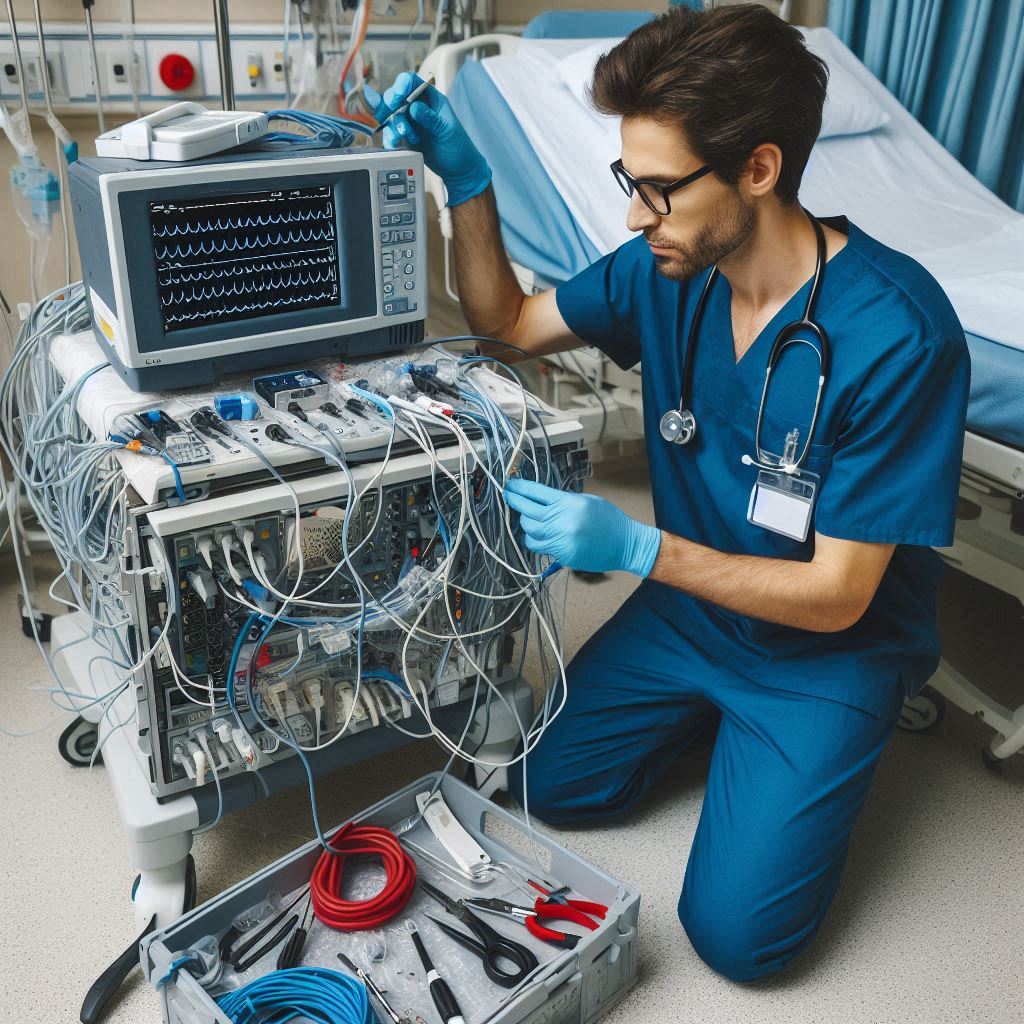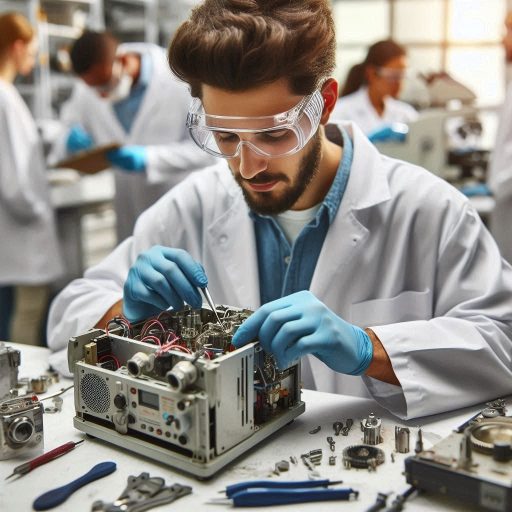Introduction
Biomedical equipment technicians are skilled professionals who manage the maintenance and repair of medical devices.
They handle a wide range of equipment, from imaging machines to life-support systems.
Their responsibilities include troubleshooting, calibrating, and ensuring that devices function correctly.
This technical role is vital in healthcare, where precision and reliability are crucial.
Importance of Biomedical Equipment Technicians in Healthcare Settings
In healthcare settings, biomedical equipment technicians play a critical role in ensuring the safety and efficacy of medical equipment.
Their work directly impacts patient care by maintaining devices that support diagnostic and therapeutic procedures.
By preventing equipment malfunctions and ensuring proper functioning, they help healthcare professionals deliver high-quality, reliable care.
Transition into Discussion of the Future of the Profession
As technology continues to advance, the role of biomedical equipment technicians will evolve.
Emerging technologies and innovations in medical devices will bring new challenges and opportunities.
In the following discussion, we will explore how these developments are shaping the future of the profession and what aspiring technicians can expect in this dynamic field.
Current Trends in Biomedical Equipment Technician Profession
Technological Advancements in Medical Equipment
The field of biomedical equipment technology is rapidly evolving.
Technological advancements are transforming medical devices, incorporating artificial intelligence and machine learning.
These innovations necessitate that technicians continuously update their skills.
New devices come with complex features and software, requiring technicians to be adept at troubleshooting both hardware and software issues.
Regular training helps technicians keep pace with these rapid technological changes.
Increasing Demand for Skilled Technicians in Healthcare Facilities
Healthcare facilities increasingly rely on advanced medical equipment.
This dependence drives a growing demand for skilled biomedical equipment technicians.
Hospitals and clinics need experts to ensure that their equipment operates flawlessly.
As technology becomes more sophisticated, the need for technicians who can manage, repair, and maintain this equipment becomes more critical.
Technicians play a crucial role in supporting healthcare facilities‘ operational efficiency.
Importance of Maintaining and Repairing Equipment for Patient Safety
Maintaining and repairing medical equipment is essential for patient safety.
Proper maintenance ensures that devices function correctly and safely, minimizing the risk of malfunctions during critical procedures.
Technicians prevent potential hazards by keeping equipment in optimal condition.
The reliability of medical equipment directly impacts patient care quality, as any failure can jeopardize outcomes.
Technicians‘ expertise in maintaining and repairing equipment is vital for upholding safety standards in healthcare settings.
In summary, technological advancements, increased demand, and the critical nature of equipment maintenance are shaping the biomedical equipment technician profession.
Technicians must adapt to new technologies and maintain high standards of safety and reliability.
Their role is increasingly important as healthcare continues to advance.
Read: Online Courses for Surveying and Mapping Technicians
Education and Training Requirements for Biomedical Equipment Technicians
Overview of Educational Programs and Certifications Available
Becoming a biomedical equipment technician requires a solid educational foundation.
Many technicians start with an associate‘s degree in biomedical equipment technology or a related field.
Bachelor‘s degrees are also available for those seeking more advanced roles.
Educational programs typically cover topics such as electronics, mechanical systems, and medical device technology.
Certifications are crucial for career advancement.
Organizations like the Association for the Advancement of Medical Instrumentation (AAMI) offer certifications, such as the Certified Biomedical Equipment Technician (CBET) credential.
These certifications validate a technician‘s skills and knowledge, making them more competitive in the job market.
They also ensure that technicians meet industry standards and regulatory requirements.
Importance of Ongoing Training to Keep Up with Changing Technology
Technology in the medical field evolves rapidly.
To stay current, biomedical equipment technicians must engage in ongoing training.
Regular professional development helps technicians learn about new technologies, equipment updates, and emerging best practices.
This continuous education is vital for maintaining proficiency and adapting to technological advancements.
Ongoing training often includes workshops, online courses, and seminars.
Many employers support their technicians in pursuing additional training opportunities.
Staying updated with the latest developments ensures that technicians can effectively manage and repair the most current medical equipment.
This ongoing education is essential for maintaining high standards of patient care and safety.
Hands-On Experience and Internships in Healthcare Settings
Hands-on experience is a crucial component of biomedical equipment training.
Internships and practical experience in healthcare settings provide valuable insights into real-world applications of classroom knowledge.
These experiences allow technicians to work directly with medical devices, learn troubleshooting techniques, and understand the workflow in healthcare facilities.
Internships often form part of educational programs, offering students the opportunity to apply their learning in a clinical environment.
This practical exposure helps them develop problem-solving skills and gain confidence in their technical abilities.
It also helps them build professional networks, which can be beneficial for career development.
In summary, a combination of formal education, certifications, ongoing training, and hands-on experience prepares biomedical equipment technicians for their roles.
Educational programs and certifications provide the foundational knowledge, while continuous learning and practical experience ensure that technicians remain skilled in managing and repairing advanced medical equipment.
This comprehensive approach is essential for success in the evolving field of biomedical technology.
Read: CAD Technician Salary: What to Expect in the USA
Job Outlook for Biomedical Equipment Technicians
Projected Growth in the Profession
The job outlook for biomedical equipment technicians is promising.
The profession is expected to experience significant growth in the coming years.
According to the U.S. Bureau of Labor Statistics, employment in this field is projected to grow by about 5% from 2022 to 2032, which is faster than the average for other occupations.
This growth is driven by an aging population and increased reliance on advanced medical technology in healthcare settings.
As healthcare facilities expand and update their equipment, the demand for skilled technicians will rise.
New technologies and the need for regular maintenance of medical devices contribute to this trend.
Technicians will play a crucial role in ensuring that healthcare systems remain efficient and effective.
Opportunities for Advancement and Specialization in Specific Areas
Biomedical equipment technicians have various opportunities for career advancement and specialization.
Technicians can pursue roles such as lead technician, equipment manager, or biomedical engineering technologist.
Each of these roles involves additional responsibilities and higher levels of expertise.
Specialization is another avenue for career growth.
Technicians can focus on specific types of equipment, such as imaging systems or surgical instruments.
Specializing in areas like radiology or infusion systems can make technicians more valuable to employers and open up opportunities for higher positions.
Professional certifications and advanced degrees can also facilitate career advancement.
For example, obtaining specialized certifications can lead to roles with greater responsibilities and higher salaries.
Continuous learning and specialization are key strategies for career development in this field.
Potential Salary Range for Technicians in Different Settings
Salaries for biomedical equipment technicians vary based on factors such as location, experience, and work setting.
On average, biomedical equipment technicians earn between $50,000 and $75,000 annually.
However, those with advanced skills or certifications may earn more.
Technicians working in hospitals often earn higher salaries compared to those in other settings, such as medical equipment manufacturers or research facilities.
Salaries can also differ by geographic location, with technicians in metropolitan areas typically earning more than those in rural regions.
In summary, the job outlook for biomedical equipment technicians is positive, with significant growth projected.
Opportunities for advancement and specialization allow technicians to further their careers and increase their earning potential.
The potential salary range is influenced by work setting, experience, and location, offering a competitive compensation package for skilled professionals in this field.
Read: Top CAD Software for Aspiring CAD Technicians

Impact of Artificial Intelligence and Automation on the Profession
Integration of AI in Medical Equipment Maintenance and Repair
Artificial Intelligence (AI) is increasingly integrated into medical equipment maintenance and repair.
AI-driven diagnostic tools can identify issues more quickly and accurately than traditional methods.
These tools analyze data from medical devices to predict potential failures before they occur.
By leveraging AI, technicians can perform more precise maintenance and reduce downtime for critical equipment.
AI also assists in troubleshooting by providing real-time insights and recommendations.
This integration helps technicians diagnose problems faster and with greater accuracy.
AI-powered systems can analyze vast amounts of operational data, leading to improved preventative maintenance strategies.
As AI continues to advance, its role in optimizing equipment management will become even more significant.
How Automation May Streamline Processes for Technicians
Automation is revolutionizing the workflow for biomedical equipment technicians.
Automated systems can handle routine tasks such as calibration, testing, and routine inspections.
This technology reduces the manual effort required for these tasks and minimizes human error.
Automation tools streamline processes by managing large volumes of data and automating repetitive procedures.
For instance, automated diagnostic systems can conduct self-checks and generate reports without constant technician oversight.
This efficiency allows technicians to focus on more complex problems and strategic maintenance tasks.
Automated inventory management systems also aid in tracking and managing medical equipment parts.
These systems ensure that necessary components are available when needed, reducing delays and improving operational efficiency.
Overall, automation enhances productivity and precision in the maintenance and repair process.
Importance of Technicians Adapting to New Technologies
As AI and automation become integral to biomedical equipment management, technicians must adapt to these new technologies.
Staying updated with technological advancements is crucial for maintaining effectiveness in the profession.
Technicians need to embrace continuous learning and professional development to keep pace with evolving tools and systems.
Adaptation involves not only understanding how to use new technologies but also how to integrate them into existing workflows.
Technicians must be adept at operating AI-driven tools and automated systems to leverage their full potential.
Embracing these technologies can enhance job performance and career prospects.
In summary, AI and automation are transforming the role of biomedical equipment technicians.
AI improves diagnostic accuracy and preventative maintenance, while automation streamlines routine tasks and data management.
Adapting to these technologies is essential for technicians to remain effective and competitive in their field.
As the profession evolves, embracing new tools and techniques will be key to success.
Read: How to Become a CAD Technician: Step-by-Step Guide
Challenges Facing Biomedical Equipment Technicians
Increasing Complexity of Medical Equipment
Biomedical equipment is becoming increasingly complex, posing significant challenges for technicians.
Modern medical devices incorporate advanced technologies such as AI, robotics, and sophisticated software.
This complexity requires technicians to have a deep understanding of both the hardware and software components of these devices.
Technicians must stay current with continuous advancements and new technologies.
The rapid pace of innovation means that they need ongoing training to manage and repair increasingly intricate systems.
Navigating the intricacies of new equipment can be daunting and demands a high level of technical proficiency.
Transform Your Career Today
Unlock a personalized career strategy that drives real results. Get tailored advice and a roadmap designed just for you.
Start NowBudget Constraints in Healthcare Facilities
Budget constraints in healthcare facilities create additional challenges for biomedical equipment technicians.
Many facilities face financial limitations that affect their ability to purchase new equipment or perform regular maintenance.
These constraints can lead to outdated or under-maintained equipment, increasing the likelihood of malfunctions and requiring more frequent repairs.
Technicians often work under pressure to make the most of limited resources.
They need to balance cost-effective solutions with the need for high-quality maintenance and repairs.
Working within tight budgets can also limit access to the latest tools and technologies, impacting their ability to perform their jobs effectively.
Need for Strong Problem-Solving Skills and Attention to Detail
Strong problem-solving skills and attention to detail are essential for biomedical equipment technicians.
Diagnosing and repairing complex medical devices requires a meticulous approach and the ability to troubleshoot under pressure.
Technicians must accurately identify issues and determine the best course of action quickly to ensure minimal disruption to patient care.
Attention to detail is crucial when handling sophisticated equipment.
Even small errors can lead to significant problems, impacting the safety and efficacy of medical devices.
Technicians need to be thorough and precise in their work to maintain high standards of quality and reliability.
In summary, biomedical equipment technicians face several challenges, including the increasing complexity of medical devices, budget constraints in healthcare facilities, and the need for strong problem-solving skills and attention to detail.
Addressing these challenges requires ongoing education, resourcefulness, and a commitment to excellence in managing and maintaining advanced medical equipment.
Role of Biomedical Equipment Technicians in Telemedicine and Remote Monitoring
Advancements in Telemedicine Technology
Telemedicine technology has rapidly evolved, expanding its role in healthcare.
Innovations include high-definition video conferencing, wearable health monitors, and remote diagnostic tools.
These advancements allow for real-time patient monitoring and virtual consultations, making healthcare more accessible and efficient.
Telemedicine systems often integrate with various medical devices, such as ECG monitors, blood glucose meters, and imaging equipment.
Biomedical equipment technicians play a crucial role in supporting these technologies.
They ensure that the devices used in telemedicine are properly maintained, calibrated, and functioning correctly.
As telemedicine continues to advance, technicians must stay updated with the latest technologies and ensure compatibility with existing systems.
How Technicians Can Support Remote Healthcare Services
Technicians support remote healthcare services by managing and maintaining the technology that enables telemedicine.
They handle the installation and setup of remote monitoring devices, ensuring that they are correctly integrated into healthcare systems.
Technicians also troubleshoot and repair equipment that supports telemedicine applications, such as video conferencing systems and remote diagnostic tools.
Their support extends to ensuring that all equipment meets regulatory and performance standards.
Technicians provide technical assistance to healthcare providers using telemedicine platforms, helping resolve issues that may arise during virtual consultations or remote monitoring.
Their expertise ensures that remote healthcare services run smoothly and effectively.
Importance of Technicians in Maintaining Equipment for Telemedicine Applications
Maintaining equipment for telemedicine applications is vital for the success of remote healthcare services.
Technicians ensure that telemedicine devices are consistently reliable and accurate, which is crucial for patient safety and the quality of care.
Regular maintenance and timely repairs prevent equipment failures that could disrupt remote consultations or monitoring.
Technicians must also address any technical issues related to data transmission and integration between devices.
They ensure that telemedicine systems are secure and compliant with healthcare regulations, protecting patient information and maintaining the integrity of remote healthcare services.
In summary, biomedical equipment technicians play a vital role in the advancement and operation of telemedicine and remote monitoring.
Their responsibilities include managing and maintaining telemedicine technologies, supporting remote healthcare services, and ensuring the reliability and security of equipment.
As telemedicine continues to grow, technicians’ expertise will be increasingly crucial in delivering effective remote healthcare solutions.
Collaboration with Healthcare Professionals and Engineers
Importance of Communication Between Technicians, Doctors, and Engineers
Effective communication between biomedical equipment technicians, doctors, and engineers is essential for optimal healthcare delivery.
Technicians must understand the specific needs and requirements of doctors who use medical devices daily.
Clear communication ensures that technicians can address issues accurately and promptly, tailoring solutions to meet clinical demands.
Engineers and technicians work closely to develop and refine medical equipment.
Technicians provide valuable feedback on equipment performance and reliability, which engineers use to make improvements.
Open lines of communication foster a collaborative environment, leading to better-designed and more effective medical technologies.
Doctors, in turn, rely on technicians to keep equipment functioning smoothly.
Regular updates and transparent communication help doctors stay informed about the status of their tools and any upcoming changes.
This collaboration helps ensure that all parties are aligned in their goals and that patient care remains a top priority.
Collaborative Efforts in Developing and Maintaining Medical Equipment
Collaboration is key in both developing and maintaining medical equipment.
Engineers often rely on technicians‘ hands-on experience to inform the design and functionality of new devices.
Technicians‘ insights into how equipment performs in real-world settings help engineers refine their designs for better usability and performance.
During the maintenance phase, teamwork between technicians and engineers ensures that any issues are addressed effectively.
Technicians may encounter technical challenges that require engineering expertise to resolve.
Conversely, engineers can benefit from technicians‘ practical knowledge to troubleshoot and implement solutions in complex scenarios.
Collaborative efforts also extend to developing maintenance protocols and user manuals.
Technicians provide input on common issues and maintenance procedures, which engineers and designers incorporate into documentation.
This teamwork results in comprehensive guidelines that support effective equipment management and use.
Opportunities for Interdisciplinary Teamwork in Healthcare Settings
Interdisciplinary teamwork offers numerous opportunities in healthcare settings.
Technicians, doctors, and engineers can collaborate on projects aimed at improving patient care and operational efficiency.
For example, developing new diagnostic tools or enhancing existing systems involves input from all three disciplines to ensure that innovations meet clinical needs and technical standards.
Healthcare settings also benefit from joint training programs where technicians and medical professionals learn about new technologies together.
This approach fosters a better understanding of how various roles contribute to patient care and encourages a unified approach to problem-solving.
In summary, collaboration between biomedical equipment technicians, doctors, and engineers is crucial for the successful development, maintenance, and utilization of medical equipment.
Effective communication, joint efforts in design and maintenance, and interdisciplinary teamwork all contribute to improving healthcare outcomes and operational efficiency.
This collaborative approach ensures that medical technologies meet the highest standards of performance and reliability.
Uncover the Details: Chemical Engineering Project Management Skills
Conclusion
The Importance of Biomedical Equipment Technicians in Healthcare
Biomedical equipment technicians are crucial to healthcare systems.
They ensure that medical devices operate reliably, which directly impacts patient safety and effective treatment.
Their work helps prevent device malfunctions that could jeopardize patient outcomes.
By maintaining and repairing sophisticated medical equipment, they enable healthcare professionals to provide the best care possible.
Optimism for the Future of the Profession
The future of biomedical equipment technology looks bright.
As medical devices become more advanced, the demand for skilled technicians will grow.
Emerging technologies such as AI, robotics, and telemedicine will introduce new challenges and opportunities.
These innovations will expand the role of technicians, making the profession more dynamic and integral to healthcare.
Encouragement for Aspiring Technicians to Pursue Education and Training Opportunities in the Field
Aspiring technicians should actively pursue education and specialized training.
Invest in relevant degrees and certifications to stay updated with technological advancements.
Continuous learning will be key to adapting to new developments in the field.
Embrace these opportunities with enthusiasm, and position yourself to make a significant impact on the future of healthcare technology.
[E-Books for Sale]
The Big Book of 500 High-Paying Jobs in America: Unlock Your Earning Potential
$19.99 • 500 High-Paying Jobs • 330 pages
Explore 500 high-paying jobs in America and learn how to boost your career, earn more, and achieve success!
See All 500 High-Paying Jobs of this E-Book
1001 Professions Without a Degree: High-Paying American Jobs You Can Start Now
$19.99 • 1001 Professions Without a Degree • 174 pages
Discover 1001 high-paying jobs without a degree! Unlock career tips, skills, and success strategies for just $19.99!




